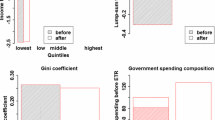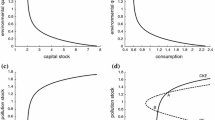Abstract
There has been much attention on the long-run effects of economic activities on the world environment. Although consumption is usually regarded as a measure of private benefit and enhances welfare, some of consumption may adversely affect the quality of environment, resulting in reducing welfare. In the analysis of environmental problems it is important to note that some dirty consumption may accumulate pollution, hurting environmental quality, while voluntary improvement of environmental quality could be employed. It is hence important to explore the implication of abatement behavior. The purpose of this paper is to investigate how the disexternality effects of polluting consumption will affect economic welfare and growth and then to investigate the normative role of Pigovian consumption taxes to internalize these effects.1
An earlier version of the paper was presented at Washington State University and Warwick conference on “Theoretical Environmental Economies and Economics in Transition”, May 27–May 29, 1999. I wish to thank to Ray Batina, Leo Hurvitz, Peter Hammond, Thams Penstrom, and other seminar participants.
As for the earlier literature, see Pigou (1920), Varian (1995), Bovenberg and de Mooij (1997) and Ihori (1999).
Access this chapter
Tax calculation will be finalised at checkout
Purchases are for personal use only
Preview
Unable to display preview. Download preview PDF.
Similar content being viewed by others
References
Bergstrom, T., L. Blume and H. Varian, 1986, On the private provision of public good, Journal of Public Economies 29, 25–49.
Bovenberg, A.L. and R.A. de Mooij, 1997, Environmental tax reform and endogenous growth, Journal of Public Economics 63, 207–238.
Ihori, T., 1999, Environmental externalities and growth, in Global Competition and Integration, eds. by R. Sato, R.V. Ramachandran, and K. Mino, 293–314. Kluwer.
Pigou, A., 1920, The Economics of Welfare, London: Macmillan.
Varian, H.R., 1995, A solution to the problem of externalities when agents are well-informed, American Economic Review 84, 1278–1293.
Editor information
Editors and Affiliations
Rights and permissions
Copyright information
© 2001 Springer Science+Business Media New York
About this chapter
Cite this chapter
Ihori, T. (2001). Environmental Externalities, Abatement Behavior and Pigovian Taxes. In: Negishi, T., Ramachandran, R.V., Mino, K. (eds) Economic Theory, Dynamics and Markets. Research Monographs in Japan-U.S. Business & Economics, vol 5. Springer, Boston, MA. https://doi.org/10.1007/978-1-4615-1677-4_15
Download citation
DOI: https://doi.org/10.1007/978-1-4615-1677-4_15
Publisher Name: Springer, Boston, MA
Print ISBN: 978-1-4613-5673-8
Online ISBN: 978-1-4615-1677-4
eBook Packages: Springer Book Archive




